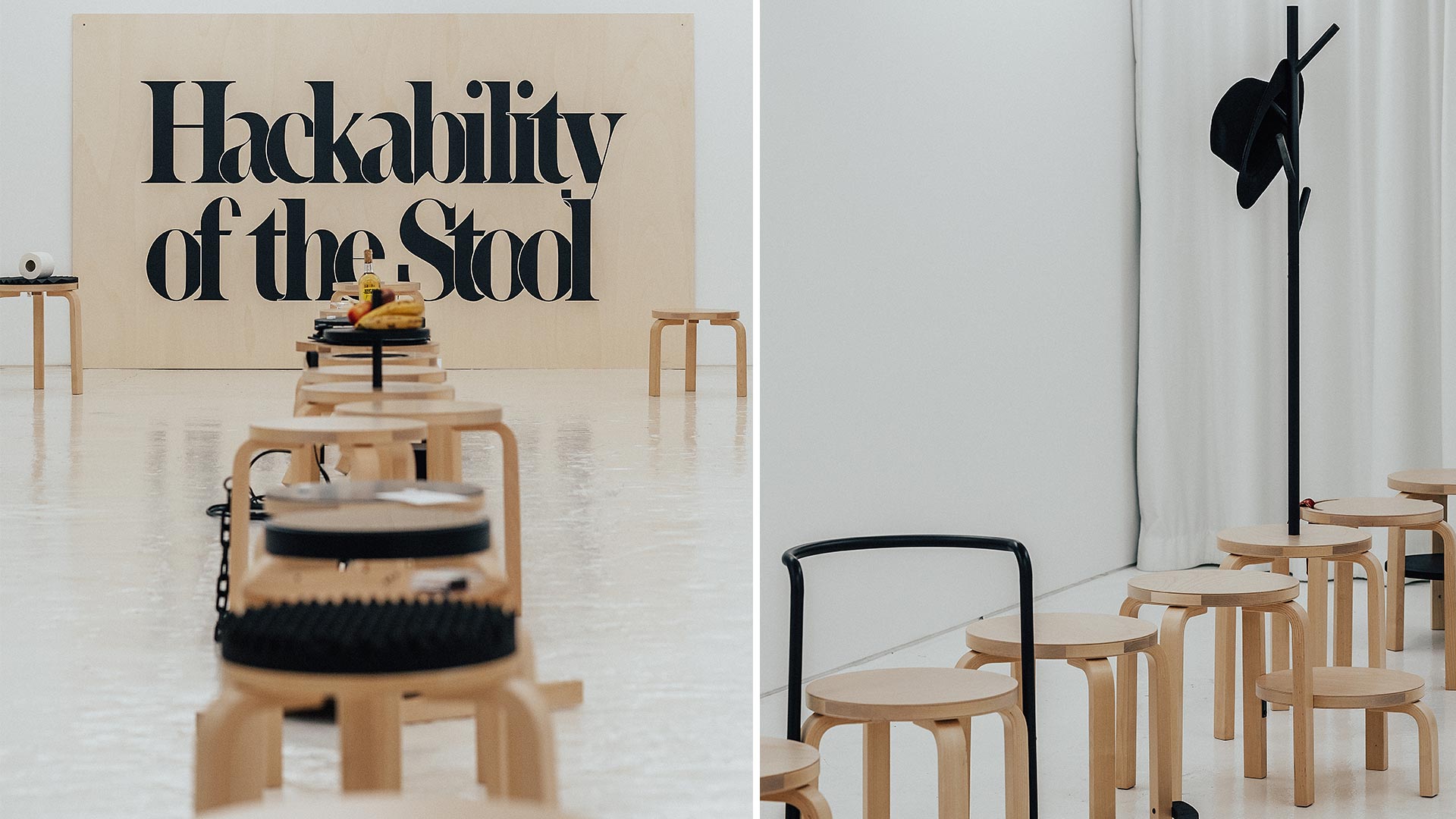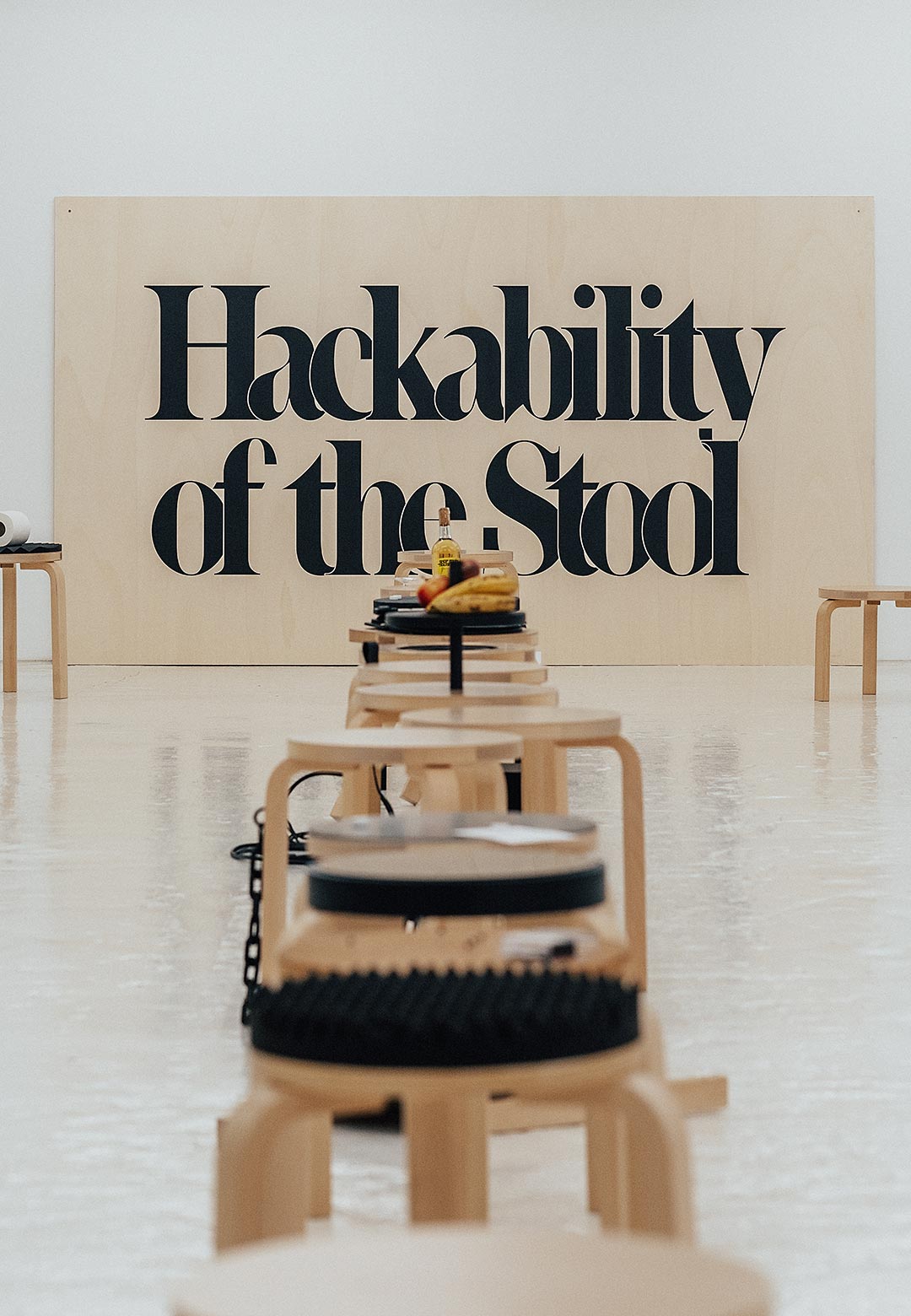Tokyo-based architect Daisuke Motogi’s ongoing showcase at the Vitra Tramshed in London, UK, hacks into Alvar Aalto's modernist classic, the 'Stool 60.' Motogi’s presentation, hosted during the ongoing London Design Festival this year, reveals 100 ideas altering the celebrated furniture design, in the Hackability of the Stool design exhibition. 2023 also marks the 90th anniversary of the 'Stool 60,' which has been in continuous production since it was designed in 1933, the brainchild of young idealists Aalto and his wife Aino Aalto, and an icon produced by Artek, a Finnish furniture company. Characterised by L-shaped, bent legs, which Aalto described as ‘little sister columns of architecture,’ the wooden stool design is recognised for its simplicity, its flexible framework that allows infinite stacking by shifting its three legs, and a design that can be flat-packed for easy transportation.
Motogi’s iterations of the stool’s original design tap into retaining a state of incompleteness and exploring its potential as a ‘field’—an uncertain, in-between state of something—be it architecture, a space, or a product, that creates freedom in choosing new functions. The concept, according to a statement from the exhibition's catalogue, has been drawn from Jun Aoki’s 2004 book Harappa to Yuenchi, in which, the Japanese architect explains how an art exhibition is better received if it is hosted inside an abandoned elementary school building, compared to if it is held inside a white cube. Elaborating on why the school's setting does a better job than the latter, the founder of Japan-based DDAA and DDAA Lab reveals, “Unlike an ordinary vacant lot or a green meadow, there is an environment and equipment left behind that can be used in any way... The simplicity of a field gives people a sense of freedom and a realisation that they can change the environment by themselves, and that, they can confront it.”
Rows of reconfigured 'Stool 60s' fill the industrial interior design of the Vitra and Artek showroom in Shoreditch, London, from September 18 - October 6, 2023, coinciding with the London Design Festival 2023—the presentation is illustrated by conceptual photographs, drawings, sketches, as well as referential artefacts.
The light brown hue of the stools is injected with the stark boldness of black-coloured additions such as a bent metal backrest, a footrest, a clothes rack, a mirror, and a lamp design affixed to the assembly. The whimsical hacks also accommodate a chessboard, a vinyl record player, a cat basket, and an iron board. As little 'domestic helpers,' the hacks open up the possibilities of the stool’s usage by intervening in its seeming completeness and fusing it with functions and elements that were originally, not intended for it.
Motogi indicates that the project's process could best be understood through what Aalto referred to as ‘decentralised standardisation.' For the Finnish architect and designer, it was the potential of the L-legs of 'Stool 60' as a system that surpassed the iconicity of the product design. His idea was to modularise parts of the system into several types and apply them to all kinds of architectural details. He was of the opinion that no one standard type of system could adjust in different contexts, and therefore, 'a system in which identical parts can be used to produce almost unlimited variations of function and form,' is imperative. As Motogi describes it, “decentralised standardisation is about diversity.”
Taking cues from there, Motogi and his team at the DDAA Lab modified the elemental design of the wooden furniture into a multi-functional one. The genesis of Hackability of the Stool can be traced back to 2019 when Motogi was commissioned to create a social space for Mistletoe, a community for collective impact initiatives. When asked to provide 150 stools for people attending a large-scale event, the Japanese architect started the process by inviting the community itself to discuss their interpretations of a stool, what they think is lacking in its conventional design, and how it can be modified. The observations from the workshop were used to brainstorm a set of ideas that could be implemented on an iconic piece of furniture. This search for an existing stool design as a base for the project led them to discover 'Stool 60,' which is described by Motogi as a good ‘field.' By adding new functionalities that were originally not intended for the stool, new possibilities of use, or 'hackability,' was generated to transcend the stool’s original purpose of just ‘something to sit on.' Thus, as Motogi intended, a design that was perceived with a high degree of completion now remains under the lens of 'a work in progress.'
The ‘Hackability of the Stool’ exhibition is on view from September 18 – October 6, 2023, at the Vitra and Artek showroom in Shoreditch, London, UK.
London Design Festival is back! In its 21st edition, the faceted fair adorns London with installations, exhibitions, and talks from major design districts including Shoreditch Design Triangle, Greenwich Peninsula, Brompton, Design London, Clerkenwell Design Trail, Mayfair, Bankside, King's Cross, and more. Click here to explore STIR’s highlights from the London Design Festival 2023.






 Sign in with email
Sign in with email










What do you think?